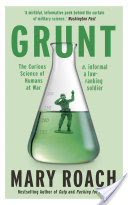 Grunt: The Curious Science of Humans at War. Mary Roach. New York: W.W. Norton & Company; 2016. 288 pages. ISBN 978-0-393-24544-8.
Grunt: The Curious Science of Humans at War. Mary Roach. New York: W.W. Norton & Company; 2016. 288 pages. ISBN 978-0-393-24544-8.
When 2016 annual meeting keynote speaker Deborah Blum spoke admiringly about her colleague Mary Roach’s upcoming book Grunt: The Curious Science of Humans at War, it seemed only natural that this be the next selection for our Council of Science Editors Goodreads Book Club.
In her previous best-selling books, Roach has used her unique approach to introduce readers to the unexpected and often wacky science of human cadavers, the afterlife, digestion, space exploration, and human sexuality. Her latest subject, military science and technology, could be considered ill-suited to Roach’s characteristic irreverence and witty asides. Perhaps recognizing this, she keeps her focus on the science of keeping soldiers safe, rather than the science of taking human lives more efficiently. As she puts it, “I’m interested in the parts no one makes movies about—not the killing, but the keeping alive.” To that end, Roach poses her trademark “dingbat questions” to audiologists, medical examiners, surgeons, entomologists, sleep researchers, and even fashion designers, all of whom work to address the “less considered adversaries” of war.
As fans of her previous work know, Roach shines when examining the obscure or absurd or when shedding light on aspects of our world that most of us have never bothered to consider. Why are zippers problematic for snipers? Why are injuries to the heel of a soldier’s foot so life-altering and difficult to repair? Why do you need to worry more about dirt and sand than shrapnel in a wound caused by an IED? Why are Ziploc bags and kitty litter helpful for long-range surveillance operations? Why do deep-sea submarines have rescue and escape systems when most operate in oceans deeper than crush depth? Why are sharks drawn to life rafts? (And, no, it’s not the smell of human blood.)
Roach is the kind of unreserved investigator who will walk up to a Special Ops guy and ask if he’s ever had a critical mission impacted by diarrhea. The happy result (besides such gems as “Yes, I have been inabilitated because of food sickness”) is that she elicits candid, fascinating details from her subject experts, often about topics others might deem embarrassing or not fit for polite conversation.
The book does suffer from some organizational issues, often reading like a series of disjointed essays as Roach jumps from topic to topic. She attempts to insert segues from one chapter to the next, but a few of these efforts seem forced. And as is inevitable with a book like this, some chapters are more engaging than others: the chapter on stress inoculation for combat medics fell flat for me, as did the one on stink bombs. Some readers may also be bothered by Roach deliberately sidestepping darker questions about the military machine and our unending appetite for war. But in the end, Roach’s winning style and keen observations overcome such deficiencies.
I should note that if you’re a squeamish type who would prefer not to read detailed accounts of genital trauma and reconstruction, the scourge of foodborne illness, or the use of maggots for wound debridement, this is perhaps not the book for you. Roach notoriously relishes in such subject matter rather than shying away from it. But if you’re curious about esoteric areas of science and appreciate a healthy dose of levity, Roach delivers another entertaining and eye-opening tour through a world of research that has a profound impact not only on the lives and well-being of men and women in uniform but also on civilians who eventually benefit from the scientific and technological advances driven by military conflict.
More on the CSE Book Club, including the current selection:

44 members
The Council of Science Editors Book Club provides a venue to share resources and discuss topics of interest in science editing/publishing.The plan is to select and read a book every few months, then discuss the work in increments (to give everyone time to read it!). We will post some questions/quotes to get things started, but we would love for the club to grow into an open discussion.Suggestions for future books welcome!Please join and participate!
*Be sure to update your notifications preferences to receive emails about new posts and discussions in the CSE Book Club!

